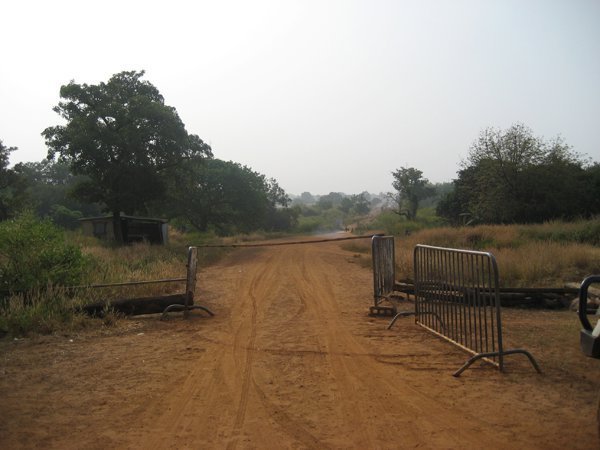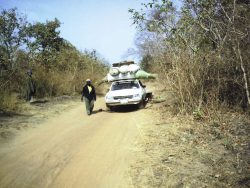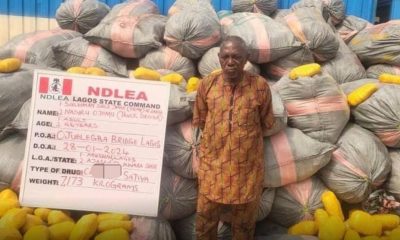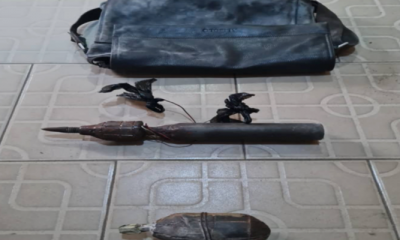By OKOSUN DENNIS
- “Appreciate us and you can go,”
That the response was from a Nigerian Immigration Service officer at the Seme border post recently.
He was stationed in one of the numerous boots close to the boot manned by men of National Drug Law Enforcement Agency (NDLEA), Nigerian Customs Service and other security agencies that dot the place.
The boot was tagged: “Surveillance and Investigation.” Therefore, if the permission to cross the border post from Nigeria into Republic of Benin would cost a paltry N100 without qualms, what is the essence of having “Surveillance and Investigation post,” of the Nigerian Immigration Service? If nobody cares whether an immigrant was carrying contraband or dangerous product – fake or adulterated – that would be injurious to humanity when consumed, what manner of surveillance?
While would tax payers’ money be expended to train, kit, and pay a group of people and the gain is only to be rewarded with having the country flooded with goods – both fake and genuine – while criminals penetrate into the country with reckless abandon. What border security is it?
Seme border post is messy. Corruption is nauseatingly provocative. It is said, “He that pays the piper, dictates the tune.” Nobody seems to care what you are carrying provided you are generous to give an olive branch of gratification.
All the checking points are concentrated on the route detached from the main gate which is used by pedestrians at Seme border. The main gate is often quiet and devoid of influx of human traffic.
Infrequently, vehicles pass through and regular checking formalities are carried out without qualms. At the other extreme, within an ambit of about 200 metres, is a jamboree of all shapes and manners of security men – some in uniform and others in mufti.
On the Nigerian side, I had the benefit of being stopped twice. While one demanded for “appreciation” – bribe, the other with gentle smiles, demanded for identification.
On the Beninois side, the story wasn’t absolutely different. The bug has infested them too. A horrible looking old man with a butt of cigarette stocked in his left hand and a stick across the narrow passage between an iron boot and a bar, spoke with baritone voice: “Bring N100 and pass.”
With scorn, I looked at him in the most sardonic manner; flashing an I.D and at the same time, introduced myself. Without uttering a word, he removed the stick and beckoned to me to go. It was a huge relief. At least, I saved my N200.
Fortunately, as I walked along the earth road, it gave a rough idea of the number of such checking points. Though, may not have been accurate, they were between eight to 10 points on both sides.
Nonplussed?
Even though the demand for “appreciation” came as a thunderbolt, certainly not expected from a man whose responsibility it is to check the influx of migrants and deter other criminal elements from penetrating into the country with the easiest attempt.
Unfortunately, the tomfooleries of terrorists have thrown up barrages of security concern globally and Nigeria in particular. However, concerted efforts by all and sundry to fight every terrorist sect that had infiltrated northeast and recently the activities of herdsmen’s incursion into the hinterland, is a thing to conjecture.
However, the proliferation of small arms and light weapons are increasingly and dangerously becoming a transnational conundrum galvanising into organized crime in Nigeria; especially since Boko Haram’s insurgency, herdsmen and the re-emergence of Niger Delta militants, which has escalated kidnappings cases, communal crisis and armed robbery in the South East, South West, North East and other regions serving as hubs or impetus for arms trafficking.
With the government officials accepting that about 1,479 illegal borders exist in Nigeria, presupposing illegal aliens, contraband, arms and ammunition swiftly waltz in and out of the country through such illegal routes, what choice are we left with?
National Daily recalls that Nigeria shares about 773km border stretch with Benin Republic, about 87km with Chad and a stretch of 1,049km with Niger republic and 1,690km with Cameroon. There is the urgent need, therefore, not to ignore such humongous space with the quantum of terrorist acts the country is currently battling with.
Intelligence survey conducted by an independent body revealed that “there are hundreds of training camps in Chad, Niger and Cameroon, being run by foreigners from as far as the Middle East and Israel regions, where recruits from these nations are hired and brainwashed into thinking they are going to fight for some “greater cause, and then they are sent into Nigeria to conduct covert operations.”
Such porosity practically serves as a leeway to the free flow of aliens cum arms into Nigeria. Due to this shortcoming perhaps, citizens of Benin Republic, Chad and Niger Republic can boast of Nigerian “National Identity Card”, “Voters Cards” and “International Passport.”
Some of them have been recruited into the military, police system and other security organisations enabling them to give first-hand information to foreign mercenaries.
They exploit the inherent weaknesses in the system to acquire these electronic ID cards for their benefits. These acts constitute threats to National Security per excellence.
In the north eastern part, which before now was a veritable hub to Boko Haram terrorists, serve as locus for trafficking of arms as well as centres for stolen goods, drugs and hostages perpetrated by criminals, terrorists and their collaborators.
With significant concentration of security men, their influx has been largely curtailed. No compliment to the recent kidnap of a French family at a border town between Nigeria and Cameroon.
Northern fringes
National Daily gathered that recently, even though no official declaration, it was revealed by the locals that over 250 footpaths exist between Damaturu and Maiduguri axis with direct link to Cameroon, Chad or Niger.
It was also reported that virtually, these paths are mostly unknown by security agencies. Therefore, the question of being manned; protected is relative. Without doubts, such routes might have served as conduit pipe or holey routes for arms and ammunitions trafficked into Nigeria and used by the insurgents against Nigerian military.
Why Nigeria must fortify its borders
Despite the Economic Community of West African Countries’ (ECOWAS) treaty that permits every member country’ citizens to engage in trade and other legal activities within the sub-region, it must also be understood that it does not stop any citizen of such member countries that engages in acts that is inimical to the peace and constitute security threat of any member country not to be restrained.
However, with the proliferation and exportation of lethal weapons, which to some extent has re-enforced the irradiancy of terrorist group using such weapons to attack the citizens, it is only human that the government of member countries, (Nigeria inclusive) to stop such illegal activities by fortifying its borders that could collapse the peace among sub-regional governments.
Urgently so, the government must begin to look at other options of intensifying foot patrol as these “merchants of death” have devised clandestine method to beat security agencies at the borders using footpaths.
Investigations revealed that such weapons are transported into the country resorting to the use of camels, donkeys and cows to traffic arms, ammunition and even drugs, like cocaine into the country.
A source said the collapsible nature of such weapons make it possible to conceal and tie it to the body of camels in a specially designed crafted skin or thatched bags making it impossible for security agents to detect.
A source told National Daily that any contraband can pass the illegal route provided you are ready and have the liquid cash to sort yourself out when peradventure the security agencies arrest you.
To confirm the veracity of the information, the bike man that was chartered between Seme border and Republic of Benin said, “I can take you to anywhere provided you pay me what I asked for. I will sort myself out when I get to any security point,” he boasted.
When asked if he could carry some goods no matter whether they are banned products or not, he intoned: “No wahala, oga, if you can pay me good money, I will carry it for you to wherever you want,” he boasted.
With weapons in the hands of Boko Haram insurgents, Niger Delta militants, herdsmen and other criminal elements especially those engaging in transnational robbery operations within Lagos, Ogun and other western states, there is the need to rejig the security architecture especially those saddled with the responsibility of patrolling Nigerian borders with neighbouring countries.
With the collaboration of Boko Haram sects said to be romancing with Al-Qaeda in the Maghreb coupled with the activities of Al-Shabab and other rebel groups in Libyan, Chad, Niger, Kenya and Mali, perhaps enjoying robust financial dependence on ISIS, it is only good that our borders must remain intact; block all loopholes and sound a note of warning to other countries that Nigeria is not a dumping ground for criminals or their activities.
More worrisome is recent comments ascribed to the Governor of Kaduna State, Mallam El-Rufai that herdsmen as terrorists penetrated into the country from Niger and other neighbouring countries adding that they have established dialogue with some while others have been compensated not to “kill his people.”
It becomes axiomatic therefore, that with the high level of killings these groups have exuded on Nigerian citizens, it is only instructive that the Federal Government and other lower levels of governance must redouble their efforts to deal with migrants that ultimately turned as terrorist to hurt citizenry.
Any solution in sight?
Although some security experts including Rotimi Aromolaran, attributed the porosity of border to that of inadequate personnel, patrol vehicles, surveillance helicopters and other equipment, some have also castigated security agents for acts of corruption peeving way for criminals to sneak into the country after collecting “gratifications and appreciation”.
To have a seamless border security, the country must act fast, first, eliminate all illegal routes that makes it easier for intruders to penetrate easily; restructure the security architecture; engage the use of innovative technology – radar and alarm systems; ensures there is discipline among patrol teams by taking punitive measures against officers found engaging in corruption “if we don’t kill corruption, corruption will kill us” as the President Mohammadu Buhari has expressly espoused.















 Football6 days ago
Football6 days ago
 Health & Fitness16 hours ago
Health & Fitness16 hours ago
 Aviation1 week ago
Aviation1 week ago
 Featured5 days ago
Featured5 days ago
 Comments and Issues6 days ago
Comments and Issues6 days ago
 Education5 days ago
Education5 days ago
 Business5 days ago
Business5 days ago
 Education1 week ago
Education1 week ago

Pingback: Porosity of Border: Why Nigeria Must Tighten Border Security – Okosun Dennis – The Columns